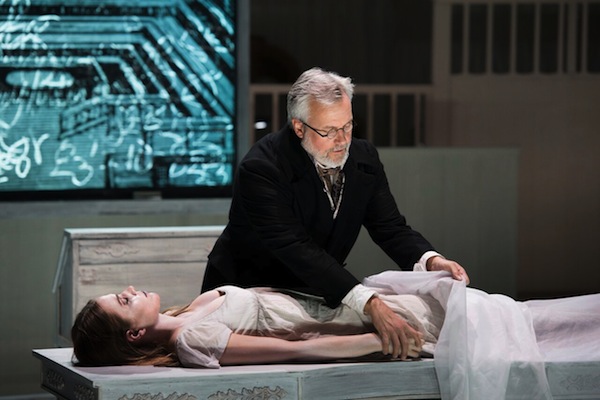Death becomes Burke and Hare in Boston Lyric Opera world premiere

William Burden as Dr. Knox and Emma Sorensen as Mary Paterson in the world premiere of Julian Grant’s “The Nefarious, Immoral but Highly Profitable Enterprise of Mr. Burke and Mr. Hare” at Boston Lyric Opera. Photo: Liza Voll
For William Burke and William Hare, the lives of the poor were no obstacle on the road to riches.
In 1828, Edinburgh’s world-renowned medical schools demanded corpses for dissection, but laws prohibited the type of bodies that could be used for experiments, resulting in a short supply.
Grave robbing had long been a particularly dirty and illegal way of obtaining bodies. But Burke and Hare hit upon a novel idea: why not lure lowly and contemptible people into a boarding house and murder them and sell their bodies to the university?
For a while the plan worked, and the pair’s ten-month killing spree resulted in one of ghastliest tales of death and profit in the long history of medical research and ethics.
The story of this dastardly duo is the basis for Julian Grant’s new opera, The Nefarious, Immoral but Highly Profitable Enterprise of Mr. Burke and Mr. Hare, which Boston Lyric Opera presented in its world premiere Wednesday night at the Boston Center for the Arts.
Grant’s opera, with libretto by Mark Campbell, is a slick and, at times, darkly humorous tale that questions the limits of morality and the worth of a life. Burke and Hare are, of course, despicable characters, who feel that they are somehow helping nature along by putting street urchins and drunks out of their misery.
But one also has little sympathy for Dr. Knox and Dr. Ferguson, who take the cadavers without question. When they realize the bodies come to them from highly immoral practices, a prospect that horrifies Ferguson, Knox reassures himself that it is all for the greater good. Knowledge, after all, must come at any cost.
The voices of the victims drive the opera’s plot. Listeners are introduced to the backstories of five corpses, most of whom, while alive, had the joy of life smashed out of them by poverty. Donald is an ex-soldier who muses upon the false hope of remembrance after one has fought for their country. Most moving is James Wilson, known on the streets as Daft Jamie, who possesses an easy-going love for life despite his position in it.
Grant’s music makes the drama and emotion of this horrific story palpable. Using a chamber ensemble of winds, percussion, and strings without violins, Grant’s textures bathe the opera in darkness. The musical language is coldly chromatic, yet there are moments of soaring lyricism that capture a sense of Britten-esque irony.
Words and music fit fluently together in a symbiotic whole, and the excellent singing consistently brought the story to life.
William Burden sang with a radiant tenor in the role of Dr. Knox. Self-assured in his quest for knowledge, Knox’s arrogance came off with conviction. His companion, Dr. Ferguson, sung with lyrical warmth by David McFerrin, was a more complicated figure, overcome by grief after he realizes his lover Mary Paterson is lying on his dissection table.
As William Hare, Craig Colclough found a powerful depth and edge of tone to capture the character’s scheming mind. Jesse Blumberg, as Burke, sang with smooth tone and a surprising touch of humanity. Though he is the one who actually committed most of the murders, Blumberg found a sort of hidden innocence in the character.
The victims’ stories were haunting. David Cushing, as Donald, sang with a strong, cavernous voice. As Abigail Simpson, Marie McLaughlin brought a silvery radiance of tone to conjure the drunken lady’s lost dreams of travel. Emma Sorensen delivered ringing high notes and a thick Scottish accent to the role of Mary Paterson, and Antonia Tamer sang the nimble lines of Madge Docherty’s part with dexterity.
The most chilling moment of the opera came in Michael Slattery’s aria as James Wilson. Singing elsewhere with a boyish innocence, Slattery rang out an icy “Turn a Blind Eye” over a lonely viola solo for an effect that stung listeners like cold wind.
Filling out the cast were Michelle Trainor and Heather Gallagher, who sang rich and glowing phrases as Burke’s and Hare’s companions, Helen McDougal and Margaret Hare respectively.
David Schweizer’s production was simple but visually appealing. Multiple scenes were handled with judicious lighting and stop-motion action. The stage and sets were clever, situated in an oval to resemble a dissection theatre. Nancy Leary’s costumes placed the action squarely in the early nineteenth century.
Set up behind the stage, the orchestra, led by David Angus, found the bold colors and sly humor laced in Grant’s score.
The Nefarious, Immoral but High Profitable Enterprise of Mr. Burke and Mr. Hare runs through Sunday at the Cyclorama at the Boston Center for the Arts. blo.org
Posted in Performances





Posted Nov 17, 2017 at 11:38 pm by Terry lantry
Another awesome performance by Michael Slattery!